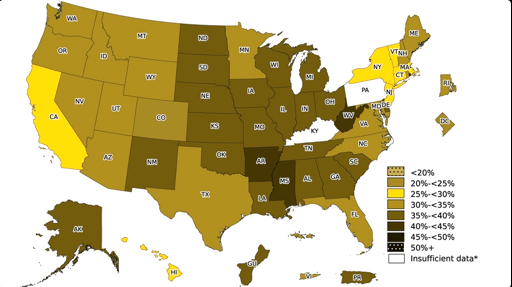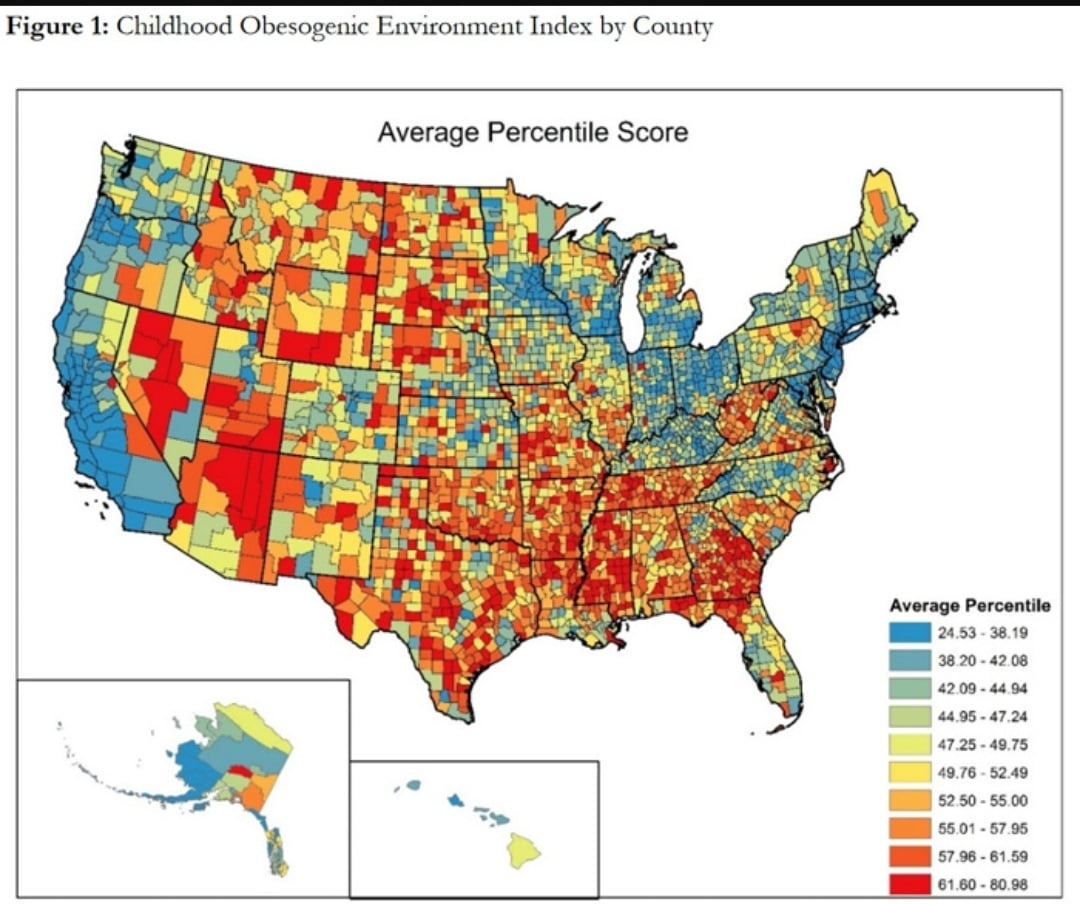I visit family in other states and I get comments like “I can’t believe you are so thin.” For context I am a healthy weight and I eat what I consider a reasonable diet. I sit and smile while I watch them drink soda and eat pure sugar and salt. I don’t care about your life choices but don’t act surprised by someone that’s a normal weight.
I like this trend of throwing other states into the ocean. For too long Alaska and Hawaii have been floating around out there on their own!
They made Rhode Island into an island, it’s perfect
That’s just cuz yo mama so fat the color wheel went all the way 'round her.
How closely does this match a heatmap for poverty levels?
Junk food is cheap so there is a correlation. It isn’t a perfect match but it is close.
What is more interesting is looking at obesity by race.
Got it. So Colorado should be predominantly rich white people.
Oh hey wait look at that, 76% white and 10% immigrant labor. With a white poverty rate of only about 7.5% (1)
Colorado here. You nailed it. We got a lot of these unbearable “health is life” turds.
Actually the white population for the US is one of the highest.
21% of the state is also of Hispanic or Latino descent and growing, but yeah, predominantly white.
An obese poor person really is a paradox!
It’s far more expensive to eat in a way that would make you fat, so maybe not poverty, but (nutrition) education levels would be a better correlation?
While ingredients for healthy food are cheaper that processed ready to made or fast food, the time and energy to cook is an expensive luxury that no everyone have.
Check out this Folding Ideas video, about food, class and the cost of cooking https://youtube.com/watch?v=V-a9VDIbZCU
Class and the cost of cooking?
I could hop on Amazon right now, find you a $30 range and a $7 toaster oven at a flea market. You can bake anything that fits into it.
If you have a home, a sink and a power outlet, you can cook, and I know a ton of you have that before you have your next Little Caesars, and if you can’t cook, you’re in luck as learning new skills is entirely free sans the time.
the time and energy to cook is an expensive luxury that no everyone have.
I would reject that statement on the basis that preparing a decent meal does NOT have to be time or energy intensive.
For example, you can make overnight oats with about 10 to 15 seconds of effort. It would be filling, healthy, cheaper than packaged cereal, and can be done with something that most people already have in their home or apartment (a fridge).
And with a visit to the thrift shop, you can get a rice cooker for like $10. And make all kinds of dishes without any effort at all.
There are so many “hacks” to make cooking quick and easy, that I’d say it’s more effort to always feel shitty because of a poor diet.
Good luck eating “overnight oats” everyday on dirty plates in a dirty kitchen, cause looks you don’t think cleaning is part of the food preparation process.
Good luck eating “overnight oats” everyday on dirty plates in a dirty kitchen
Goddamn, where are you eating your meals, bro?
Cleanup is SUPER EASY.
I don’t understand what everyone is doing to make food prep and cleanup such a nightmare, but it really doesn’t have to be difficult, unless you make it difficult.
Sounds like you’re not the one who cook or clean in your home.
Yes, I do, along with the grocery shopping. For a family of 4.
Since the pandemic, we really had to tighten up on our grocery budget, so we learned where to save money on food while making food prep easier (so we aren’t relying on convenience foods).
As an example, we were spending something like $15 to $20 per week on non-dairy milk. So, we just make that at home for pennies at a time. Takes <10 minutes to make a week’s worth, then we reuse the glass jars. No waste, no running to the store, no filler ingredients.
We do also make use of an instant pot and bread machine. Low effort, but high-quality food that’s cheap.
Food prep (and cleanup) is a skill that I hope everyone can take at least some time to learn. It carries through to the rest of your life, and you’ll have better health as a result.
Don’t get me wrong, we definitely still buy convenience and packaged food, but they aren’t the meal. Even as snacks, these foods are far too expensive to have all the time.
I love to cook and always have. When I was working 2 jobs (and some additional freelance/part time) to keep a roof over our heads, there was zero chance I had the time, money, and energy to cook. Living in a food desert, I would have to spend gas money I didn’t have to go to a proper store to buy things and that would eat about 50 minutes more of my already-sleep-deprived day. Don’t even get me started on when I lived out of a car for a while. And I’m fortunate that I even had the car. Public transit was terrible where I lived at the time and basically useless unless you want to spend 3-4 hours a day commuting. There were no sidewalks and multi-lane roads with high speed limits. The social safety net is also in terrible shape, moreso today than back then.
“Only $10” also shows how out-of-touch you can be for the real situation that people have, particularly in areas of the rust belt and coal mining areas where the employers frequently left. I also worked in worker’s comp in healthcare IT and let me tell you that people with lifelong problems from the mines frequently get denied care as the mines fight just about everything, so there are people who have a really rough time and need more care for their families which is still more time and money in places with few jobs left to go around. These people also don’t have the resources to “just move”, either. This doesn’t even go into the opioid epidemic that also is an issue from overprescription in those areas and other confounding factors.
Highly processed, high sugar foods are generally less expensive.
Highly processed, high sugar foods are generally less expensive.
It may seem that way, but I’d love to have some examples.
FWIW, I do the grocery shopping in the home, and find that highly processed foods, for the amount you get, is far more expensive than real food.
I’m eating shitty delivered food (including mcdonalds) and I am losing weight. The problem isn’t “bad food” it’s all about controlling calories intake. The only moment where that might not work is if you have some issues - hormonal imbalance or some sort of other illness. But if you eat less and can maintain / withstand that, you will lose weight.
A part that complicates it is nutrition. Nutrients are related to food cravings, but if you don’t have access to food that has the nutrients your body is craving, you might eat other things in an attempt to satisfy that craving. But since they don’t contain what your body needs, the craving doesn’t go away, so the drive to eat more remains.
It’s like the difference between being satisfied and full. For the first one, your body decides it doesn’t need anything more and the desire to eat just isn’t urgent (comfort/habit eating can still be a thing though). When you’re full, it just means your stomach is full and you can’t eat more without discomfort. But once there’s room again, the hunger might return.
It was something I’d always notice with McDonald’s. One big Mac never felt like it was enough. I’d eat the food and then be disappointed because it was all gone but I still wanted to eat.
But a good meal with a variety of ingredients can satisfy even if the volume of food isn’t high. Like I’ve only tried fine dining once and went in to the 9 course meal expecting to need to stop for a burger or something afterwards because I knew the portions of each course would be tiny. I walked out of that restaurant with room in my belly but no desire to fill it with anything else.
It’s also why pregnancy cravings are so strong. The body needs more nutrients when building another body, plus the timing of accessing those nutrients is more important.
The problem isn’t “bad food” it’s all about controlling calories intake.
Yup, that’s what I’ve always said.
Top athletes eat loads and loads and loads of highly processed, high calorie food… and they have low body fat and are at peak fitness.
That’s because they treat food a fuel, and if people are eating food (fuel) as if they were a competitive athlete, but spend their day in a chair, they’re going to get fat!
But in terms of cost, it’s way more expensive to be eating delivered food than to make basic recipes.
Yeah, for sure. The problem is cooking for one. If you are inexperienced, you tend to overcook and then you either waste that or eat the same thing for five days. Also picky eaters sometimes can’t eat the same thing two days in a row, let alone more. Buuut if you treat cooking as “a job” that pays more than ordering out (where you don’t pay with your time), then it is really worth it for sure.
The problem is cooking for one. If you are inexperienced, you tend to overcook and then you either waste that or eat the same thing for five days.
I honestly think it’s a shame that more people don’t learn how to prepare food, even if it’s just decent quality quick meals.
It’s a skill that everyone should know, not only to help save money, but to nourish the body without much effort.
Sure, if you like making extravagant meals, go for it! Cooking can be a hobby, too.
But so many meals can be made with less than 10 minutes of effort, and you can scale up the quantity to feed your entire family without adding more time and lowering the overall cost per portion.
It doesn’t mean extravagant, it means “a lot of food to eat”. I know how to cook. The intuition of how much I need to cook comes with more experience, but it means I’d need to go through months of me cooking too much and either throwing it away, or eating the same thing for a long time. When you cook for two or more, the dishes just disappear. You can skip a day, your partner will eat it though. So then you do, and suddenly four days worth of meals are gone.
The intuition of how much I need to cook comes with more experience, but it means I’d need to go through months of me cooking too much and either throwing it away, or eating the same thing for a long time.
I know exactly what you mean! Having raised kids, and now grandkids, this problem can come up often!
My only suggestion here (for anyone), is to make less than you think you can eat, and then have simple sides or snacks to cover any shortfalls. It’s far too easy to over prepare meals, so you do bring up a good point!
It’s always funny to me to watch single people who have been skinny their entire life try to coach the world on how to be like them.
There is an entire world outside of your little shell, very few people will fit in to the narrow view of the world you have and those that do don’t need your advice, they already look and eat like you.
There are myriad luxuries that contribute to your, apparently quite successful lifestyle. Had you actually encountered the hardships you claim to be able to resolve with some fucking oats, you’d be able to grasp the true depths of how idiotic the suggestion is.
I congratulate you on your success, but please shut up. The poors are in no further need of out of touch advice, they get plenty.
Home economics used to be an elective.
Sad to say, but I feel cooking is an essential, base skill that everyone should have at least a small grasp on, at least for their own wellbeing.
It’s amazing for me to consider that anyone could bake a loaf of bread in their kitchen in a few hours, and nobody, not even Musk could taste it, not even if he wanted to. It’s a sense of ownership and accomplishment, and you… won’t die of starvation, so it has that going for it too.
It’s amazing for me to consider that anyone could bake a loaf of bread in their kitchen in a few hours, and nobody, not even Musk could taste it, not even if he wanted to. It’s a sense of ownership and accomplishment, and you… won’t die of starvation, so it has that going for it too.
That’s such a wonderful perspective! And funny enough, I’ve got a loaf in the bread maker! 😂
The 1% can eat the most expensive steak ever produced, the most valuable cake ever baked, the most rare and exotic delicacy, but those shitheads ain’t having a LICK of this goddamn bread. It is exclusively, an experience for you and anyone you share it with and no one else. That is the big revelation to cooking. Every single dish is one of a kind if you treat it that way.
Coding data in color is a pet-peeve of mine. As a colorblind person, maps like this are nearly useless to me.
Dark = bad
Simulated red/green colorblind (the most common one). Dark = bad sorta works but not all the way.

This is how I see the map. Didn’t notice CO was green until a comment mentioned it.
That’s cause red and green both look like puke green to people with the most common type of colorblindness.
it’s really just a Gameboy huh
I first got this realization when I started using grey scale mode for my phone at night. A “good to bad” scale in an app became unintelligible. Since then I try to consider colorblindness if I design stuff myself. It’s fantastic if color scales carry meaning in both their colour but also the same meaning in their lightness, so everyone can understand them the same.
The green is almost exactly the same in value as the red or orange, whatever that color is.
If it helps, Washington D.C. and Colorado are the only “green” ones.
I don’t see anything represented by the “<20%”, “45%-50%” or “50%+” colors. Not sure why they’re even included.
Thanks, I could kind of tell CO by comparing to those around it, but that’s not an option the way DC is presented.
The first 2 on the legend look darker than the following 3 .
I agree with the zombiepirate. Colour coded maps are useless for about 25% of the population.
The green doesn’t follow that.
Mildly infuriating you didn’t say what’s being measured.
It is in my title
I created this post and then edited it a few seconds later. Apparently the changes didn’t propagate.
Ah yes. I too have 20% obesity.
But what about your state?
Fat explosion
Sure, but what constitutes obesity in the U.S.A.?
It is based on BMI
I first noticed when I went to a Walmart in the Midwest.
I understand it would be based on BMI, but the threshold for obesity varies per country. I remember the health ministry in my country increased the threshold for obesity from 24 to 25 in an attempt to decrease the obesity numbers.
Eventually, BMI only works for “regular” people and not for “sportive” people or “athletes” as muscle is heavier than fat. (A body builder may have a BMI of 26 with little to no fat)
BMI “works” for populations. It was originally designed and characterized to measure populations, and so it’s the perfect thing to compare massive populations, like states. The majority of people are adequately characterized by BMI, just as they are by waist circumference measures. The “outliers” are vastly more likely to pipe up online.
The people who don’t understand what you mean but are obese are more likely to pipe up online.
Anecdotal story about Colorado.
I visited CO a couple of times a while ago for work. I was in my mid 30’s (2007) and fairly fit. I left Cincinnati Airport surrounded by overweight people all around me where I felt pretty good about myself. I arrived in Denver, and suddenly felt like I was on the less fit side of the spectrum.
It was VERY obvious the change. It was not something I noticed / thought about in Cincinnati, but it hit me like a ton of bricks when I landed in CO.
I’ve talked about that experience through the years. I have to watch what I eat, and work to be ‘as fit’ as I am, it definitely does not just come natural or anything remotely like. I drove around / hiked pretty much every moment I was not working and both trips were amazing. Such a beautiful state!
When I went to Japan in college for 2.5 months I felt kinda big (I was normal weight), but then my flight back home stopped in Texas and…WOW the absolute SHOCK. I felt like a twig. This was many years ago and I still remember it so clearly.
I got to experience Japan too, but I was even younger but 6’ tall. So my experience there was mostly around how I could see over everyone :)
I live in Japan and am overweight, though slowly dropping it. Two years ago, I went back for the first time in like 6+ years and was shocked and horrified at how huge people were.
When I moved to Colorado from the midwest in the 90’s, my weight started to drop. When I left Colorado for Arizona, my weight went back up.
Partly it was the food, but really it was the outdoor activities… if you wanted to hang with friends, you spent time outside. (Though restaurants seemed to have healthier options, there were just less restaurants overall so I ended up cooking more too)
Ya, the amount of people outside bicycling, hiking, rafting I saw out there was awesome!
I think there is a lot less of a sugar culture here. People drink water and seek fresh food. If people are seeking junk companies will serve junk. When the general population wants fresh healthy meals that is what companies will sell. In my experience many people in Colorado want healthier food which creates a demand.
I think it has to do with the population
Is it possible they’re expressing admiration or paying you a compliment and not trying to invoke your smirking condescension?
Incidentally, according to the most recent CDC numbers, Colorado is no longer “green” on this map, just Hawaii and DC.
There’s only eight states under 30%. West Virgina tops the numbers at 41%.
~75% of the United States is classified as overweight or obese, which is staggering. It has to be pretty unevenly distributed even within states, because I live in a college town in a low-middle-weight state, and very few appear obese, and I’m regularly in a nearby major metro, and I don’t see a ton of obese people there either. Rural children are 10-15 times more likely to obese, so I’m guessing that is probably a major factor as well.
25-35% obesity rates covers like 80% of states, so the US is just fat and getting fatter.
Unevenly distributed, but also statistical bias. Anywhere you go obese people are less likely to be out and about.
A good way to sample is a hospital or Dr office waiting room.
That be the inverse uneven distribution. You want somewhere everyone has to go, regardless of health
Pretty sure healthy and unhealthy people go to the doctors for check ups. In fact, healthy people might be more likely to go to their annual appointment.
An annual checkup is a blip in comparison to the frequency of visits by the unhealthy
Is it getting fatter, though? Modern obesity drugs have got to be making a dent now.
Well for the wealthy, sure. Can’t ever stop taking your drugs to fix your life and need the funds to do it.
I’d expect a county map to more appropriately show the trend. Coastal cities can steamroll stats for a state with vastly disproportional representation. I would expect cities to have lower obesity rates due to increased travel by walking while deep rural counties to have higher rates due to driving everywhere, including on your own property. Perhaps it’s not California and New York that’s doing the right thing, but rather LA and NYC doing the heavy lifting. A county map could also pull in variation correlated to ethnicity of people (genetics, imported cultural norms) and ethnicity/variety of food available, too (can you get fresh fare or is it all McDonald’s?). I would expect DC to be more in line with other large metro counties.
Basically the same issues with the electoral college. States are big and not necessarily a good representation of human statistics. Counties may not be granular enough, but I expect it to be an improvement. I’m not seeing date marked results past 2008.
I have no relevant comments for Colorado, I don’t get it
Agreed. A more granular map would be interesting to see. I mean, something like 65% of NY state’s population live in the NYC metro, which is a tiny part of a deceptively large state.
Re: Colorado, it’s just a relatively healthy state with a general ethos of living well. I think you’re seeing some of the urban effect through the Denver, Colorado Springs, etc. and the addition of rural areas of Colorado still having an outdoorsy culture, as well as (often) affluent rather than “rural poor.” Colorado has one of the lowest rural poverty rates in the United States.
And since Colorado would be in the 25-29.9 category now, it’s comparable to many states that also have comparable rural poverty rates. The fact that the states with the highest rural poverty also have the highest weights makes me assume obesity rates and poverty rates heavily overlap.
Edit: to the point, look at the county map for childhood obesity. You can literally point out almost every major city in the United States.

I think the main problem is that people are eating way to much sugar and salt. The problem is that a lot food you can buy at the store has way to much sugar and salt. Also some people have grown up being conditioned to eat junk like heavy sugar and grease.
Do you have any source for salt casing obesity? I’ve never heard of that being a thing.
It doesn’t cause obesity to my knowledge. It does cause heart disease and blocks circulation.
When I say salt I also mean cholesterol and saturated fat
Nice, I live in insufficient data!
Kentucky: “don’t bother asking”
If you look at the numbers from the state it would be dark red
As someone who moved from california to nebraska, holy shit are people out here severely overweight. Working food service makes you see it way more as well, more often than not they buy about 3 peoples worth of food, sit down, and eat it all for lunch… then complain about the price of course
Why can’t I lose weight? Drinks Soda pop
I think part of the problem is that junk food just doesn’t stick with you. It spikes your sugar and then you crash. You need to constantly be eating to maintain your energy.
How did CO do that? Free lunch in school? This does not seem to be something you can do by having more virtuous people.
Coloradans typically live a very active lifestyle. Outdoor recreation is a huge part of people’s lives. Therefore they’re moving a lot more and typically thinner
Ok, but what makes them this way. All of their neighbors have above average obesity.
The outside be nice and shit.
Also decent accessibility and cycling (compared to the deep red states)
This guy went there and asked everyone the same question: https://youtu.be/2rb198Hgllk?si=5RJYtCB9WLaV6W0s
Basically just social pressure driving everyone to be skinny, or be shunned. Lots of eating disorders.
Eating like a normal person doesn’t mean eating disorders. I just don’t eat a lot of sugar and I make fresh food.
I physically feel bad when I eat to much junk. Healthy food makes you feel better as it doesn’t spike your sugar.
Plus sugar and salt make exercise unpleasant
I live in Colorado, and one day I stepped on the scale and noticed that I hit a milestone, did the math and realized that per my BMI I just hit the obese line (check yours, it’s probably lower than you think).
I decided that I was not going to be the guy fucking up this map for my fellow Coloradans, so I started eating more vegetables, fewer carbs, and fewer calories overall, and lost 25 pounds.
So, I’d say peer pressure helps.
Get out and go for a hike. That will help immensely.
High elevation makes the body work harder because there’s less oxygen. Elite athletes train in the high country for the effects.
Only for a short period of time. You adapt and the effects go away since your body creates more red blood cells.
But then those athletes go down to sea level for a competition and have an advantage
For a few days as your body recycles the extra red blood cells
Yup. Go to high elevations, and until you acclimate you’ll feel a little off. Go to low elevations, and for the equal but opposite reasons you can run a marathon and outdrink anyone.
Altitude is an appetite suppressant.
The trend of altitude being inversely correlated with obesity rates is really obvious from county-level data. That trend persists across multiple countries, but the specific correlation varies from country to country, in a way that suggests that rich countries have a stronger inverse correlation between altitude and obesity.
Today I learned….
Haha. What’s interesting is there’s other high country in the US but it’s not green in this map. Wyoming, Montana, Utah, Idaho…
And with the exception of vermont and a small part of NY, most of the yellow in the northeast is low lying areas not very high above sea level. California has mountains too.
That’s why the county level data makes the trend that much more obvious, because the states tend to clump big groups together. Here’s an example.
There, you can see that Colorado is special in that its rural counties tend to be low obesity, compared to even its neighbors in the Rockies. You also see a sliver of green following the Appalachian Mountains.
And obviously it isn’t the only factor. Poverty is really important, as are lifestyles (and the intentional and unintentional features of any given community in incentivizing or disincentivizing things like walking, regular exercise, eating healthy, etc.).
Oh yeah, it near perfectly captures where the mountains are. The green areas are mountains and cities. NH is interesting, the darkest part is where the ski areas are, the lighter part is the more populated area.
Are you sure it is not the other way around? Maybe the driven people who are physically fit are moving to higher elevation. If someone is obese they probably aren’t going to move to rual mountains
I’m wondering what bias there may be for people from a place versus moving to a place. Many have noted the culture of activity in Colorado, and that may be pulling non-obese people from other states to Colorado. Not that it would sway the numbers that much, but as an anecdote, everyone I know in Colorado moved there from a different state and fit, and moved there for activities.
Culture of healthy thinking plus a lot of athletics
Living in a green state can’t be that bad. It’s green!
Green state, currently enjoying some green. It’s not bad at all.
Too much green, and you may crave a burrito with green chili!
I feel as if your threatening me with a good time.
I also live in a green state and think of myself as a bit overweight. Visited family in MS, I’m a Mississippi 9 at least!
You sound like tons of fun.
I’m not sure why you’re getting down voted but I like the joke.
Username doesn’t check out?
It used to. 2014 I almost passed out at the top of pikes peak due to me weight and how out of shape I was. I fixed that!
Lost 80lbs over 2 years and feel younger now than I did in 2014.
Congratulations!
I think having a healthy lifestyle really boosts mental health. Also healthier foods stick with you a lot longer so you don’t get the spike followed by the crash.
Totally agreed! It’s amazing how bad eating trash makes me feel over time.
I see that “snitches get stitches” is still in effect in Philly.
Area covered by lava?















